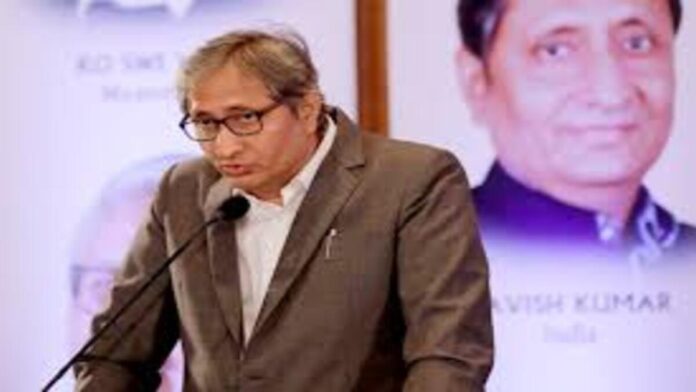The best films about the Holocaust, according to director Anurag Kashyap, were produced after it had already occurred. This was a novel response to the subject of whether free expression and innovation are being curtailed in the current political environment. However, it’s a little odd that he made this statement just a few days before the’release’ of two brand-new films that speak candidly about the times we live in (after a number of other recently released films that were as daring). The first one—the vigilante thriller Jawan starring Shah Rukh Khan—you’ve undoubtedly already seen. The second, however, is a movie you’ve probably only heard of: While We Watched, a documentary by director Vinay Shukla.
In terms of tone and treatment, both movies couldn’t be more dissimilar from one another — one is a Rs 300 crore action-thriller given the largest audience possible, while the other is a modest documentary that hasn’t yet been distributed commercially in the nation it is fighting for. However, despite their apparent differences, they are connected by a common DNA. This one week not only restored faith in the artistic diversity of our cinema, it also reassured audiences that the struggle continues. There has already been plenty written about Jawan, but there is no end to what can be said about While We Watched, the third documentary in this new golden age of Indian filmmaking. Incidentally, two of these movies are about journalism; all three are about India under the BJP.
While We Watched, a nerve-wracking 94-minute film that is essentially a profile of former NDTV journalist Ravish Kumar, also serves as a dystopian thriller, a character study on loneliness, and a drama about a newsroom in distress. But more than anything else, it appears to be the year’s best war film. Although the future of the nation is at stake, the conflict is confined to New Delhi’s political corridors. Battening down the hatches in anticipation of an all-out enemy assault, the resistance. However, one soldier is still engaged in battle to avert a loss whose effects would not be felt for decades. This is the final defense.
And he drags us into the battle beside him. Paths of Glory-style tracking shots of Kumar moving through the NDTV newsroom’s corridors. He doesn’t really look anyone in the eye as he glides to his cabin, which resembles a claustrophobic underground bunker. As he moves by, the sea of humanity appears to split. This newsroom is depressing; there is little energy or pleasure there. Small successes aren’t celebrated around here, but people do gasp when a setback is announced. Kumar’s cabin serves as his fortress, but the studio serves as his battleground. He sets up shop here every day, aims his gun squarely at the camera, and starts shooting.
The film was shot over the course of two years, during which Kumar ‘lost’ many of his cohorts; some were literally murdered by the enemy, others revealed themselves to be turncoats. Every day begins with an inescapable sense of uncertainty about who’ll make it out on the other side. Kumar can’t hold back his tears — this is the only time in the movie that he appears to break — when his closest lieutenant, a producer who’d worked with him for over a decade, quits abruptly one day. He eulogises her on camera.
The troop bids farewell to old brothers-in-arms with cake, a bittersweet motif in a movie that always seems to be shrouded by an ominous pall. While We Watched is a tense and sombre experience that accurately captures the disillusionment that many in the media industry — at least those who haven’t rolled over yet — can currently feel. While foreign audiences might not understand the full context of events, it’s disheartening to watch an institution like NDTV come across as a fringe outfit on the verge of collapse, and, for that matter, to not get a true sense of Kumar’s influence.
We are given information about the larger conflict and events that are occurring outside of his individual engagements in a number of sequences. The story of our country is told through news footage that is intercut with the vérité-style drama since the film develops fully from Kumar’s point of view and the camera never leaves him, almost as if it were a subordinate sworn to support its commander. He frequently receives threatening phone calls, and murder threats are sent to him on WhatsApp disguised as “good morning” messages. Without knowing, of course, that the anti-corruption movement would prove to be the single-most important moment in our country’s recent political history, the tone of Shukla’s previous film, An Insignificant Man, which captured the ideallism of the early days of the Aam Aadmi Party, could not have been more dissimilar.
In addition to being the subjects of documentaries made by Shukla, Kejriwal and Kumar also share the distinction of having received the coveted Ramon Magsaysay Award. It’s appropriate that Kumar mentions war in his acceptance speech after getting the honor. “Not all battles are fought for victory,” he said. “Some are fought simply to tell the world that someone was there on the battlefield.” The incident is also featured in the movie, giving it what is meant to be a pleasantly upbeat conclusion. But wait—is it really? The chances are against Kumar, he admits. Unavoidable defeat will occur; the question is not if it will, but rather when. And although it’s necessary to remember those who died on the battlefield, it’s also important to remember that the war was lost.




